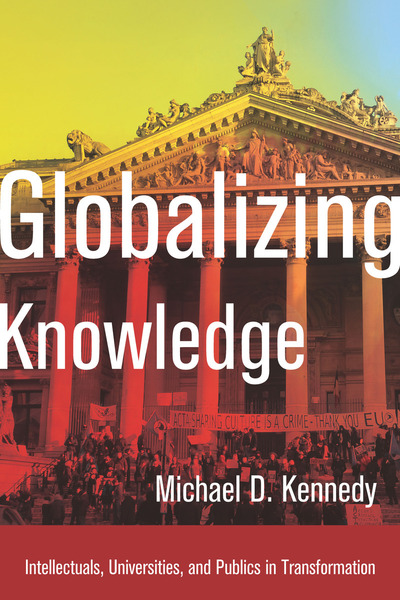While institutions like universities legitimate themselves through intimations of worldliness made with invocations of civilizations elsewhere and by the use of artifacts and technologies fabricated in other nations, globalizing knowledge, as a potentially powerful cultural formation, need not be about self-glorification. We globalize knowledge in different ways, with various expressions of selectivity and greater and lesser degrees of reflexivity, for multiple scholarly purposes. In my book Globalizing Knowledge, I invite readers to think about which places, whose histories and knowledge cultures, merit recognition and by whom; to consider what and how we translate across contexts; and, as a further challenge, to consider how we rearticulate, with power and privilege in mind, the various fusions of regional knowledgeabilities in addressing the issues, challenges, and crises of the twenty-first century.1 Stanford University Press: 2014More info → Globalizing Knowledge is thus about those potentials of recognition, translation, and rearticulation; assuming that if we understand better their conditions, manners, and implications, we might mobilize knowledge more effectively in the address of our century’s challenges and opportunities.
Stanford University Press: 2014More info → Globalizing Knowledge is thus about those potentials of recognition, translation, and rearticulation; assuming that if we understand better their conditions, manners, and implications, we might mobilize knowledge more effectively in the address of our century’s challenges and opportunities.
Grounding scholarship
“Interdisciplinarity is assumed in any discussion of globalizing knowledge.”Interdisciplinarity is assumed in any discussion of globalizing knowledge. I am a sociologist, and my disciplinary accent is no doubt apparent, but I assume intellectual and knowledge institutional responsibility in relation to global publics cannot be anything but interdisciplinary. I certainly did not compare internationalism, interdisciplinarity, and public scholarship explicitly in my book, but I can use the book’s contents and its subsequent discussions to articulate each of these border-transgressing practices within a broader knowledge cultural sociology.2Over the last several years, I have been using “knowledge cultural sociology” to locate my own sociology. It clearly builds on the work of friends and colleagues who write of “knowledge cultures.” In this sense, I propose to turn that concept into an adjective much as economy births economic and political economy births political economic. It also connotes a transformation similar to what happened with the mutation of the sociology of culture into cultural sociology. Rather than treat knowledge as dependent variable only, I work to figure how different knowledgeabilities, as different symbols and schemas, might shape social change. Each of those border-crossing references depends on a fairly justifiable assumption about the power of the “discipline” as such. Consider how disciplines organize knowledge cultural claims to authority through domain assumptions, intellectual genealogies and journals, professional training, associations and labor markets, and public legitimations. Only those intellectuals with the greatest credentials can legitimate their claims without disciplinary grounding.
Some disciplines, however, are so internally heterogeneous that collaboration within a discipline looks like work across disciplines—think of demography and political economy nowadays in sociology. And some modes of interdisciplinarity are so well organized that they are virtual disciplines: think of demography and political economy, again.
Then consider demography and political economy in contrast to area studies. There are no flagship journals for area studies in general. Comparative Studies in Society and History may be among the closest, but its close association with history and anthropology and its relatively weak ties to sociology, political science, and especially economics over the last few decades suggest the distinction.3 The recent appointments of sociologist Genevieve Zubrzycki and historian/anthropologist Paul Johnson as co-editors could extend the journal’s disciplinary reach, however. Area studies is much more interdisciplinary than demography or political economy because it does not share intellectual or organizational ties across regional foci beyond a few lobbying efforts, and that typically takes place within national polities.
During my time at the University of Michigan, we tried to promote the notion that area studies knowledge cultures do share a commitment to contextual expertise, but disciplinary differences over what that means beyond language competence varied too much to enable a common rigorous training.4 That effort was facilitated by support from the Ford Foundation in its project on “Crossing Borders: Revitalizing Area Studies.”
Michigan’s project was led by David William Cohen, who proposed we organize our work around the articulation of grounding, translation, and expertise. Such a methods course is, however, justifiably the holy grail of area studies knowledge cultural consolidation.
How publics shape scholarship
However, such a course would not just be methodological in the common ivory tower sense. Yes, disciplines will contest the proper balance of different kinds of critical reading skills, ethnography, archival work, and institutional analysis, but there are also very different political sensibilities across world regions. Those are most readily apparent in how we read the power of the world system’s historic European and North American core. At the very least, we can see scholars of, and in, some regions must read against the grain of global institutions, while others define their region’s study with globally hegemonic institutions setting the terms.
Contrast, most obviously, African and European studies within the United States. African studies is difficult to practice with an assumption that colonial powers and their descendants crafted institutions that were, more or less, sound. African publics and their authorities, and the colleagues in Africa with whom American Africanists collaborate, cannot take as point of departure the fundamental legitimacy of global institutions. By contrast, many European Union scholars assumed the basic soundness of its institutions, until the refugee, Euro, Brexit, et al. crises disrupted the ease with which hegemony could organize their knowledge work. But even with crises at hand, the assumption that power can work to assure a global peace and prosperity is much more apparent, still, among those grounding scholarship in Europe than in Africa.
“We need to consider how the very terms of cultural formation articulate different proximities for various publics across the world.”
When we consider interdisciplinarity across national boundaries, we need do more than think about how academically and professionally accredited knowledge cultures intersect. We need to consider the variable degrees of distance these knowledge cultures have from publics beyond the domains of their expertise. This has been made quite clear in more disciplined discussions around public sociology and public humanities, for example. But when we think about globalizing knowledge, we need to consider how the very terms of cultural formation articulate different proximities for various publics across the world.
Knowledge for global publics
For those who practice their interdisciplinarity within global institutions, it’s relatively easy to imagine more or less common knowledge cultures with anchoring scholarly and professional legitimations. Indeed, globalizing knowledge through “globally influential” intellectuals or the most highly accomplished universities in various global rankings stratify global publics themselves. If that global endeavor promises to address a public issue, it’s typically without publics in the room or as anything more than a beneficiary of intellectual work. Partnership is hard to manage when there is no common obligation implied by proximity, citizenship, or some other kind of identification.
“Knowledge institutions and networks face that challenge in ways other social formations don’t.”Of course some global intellectual agendas are hard to imagine with public partners even if interdisciplinarity is readily apparent. Life sciences around genetics and climate sciences around geological and biochemical transformations suggest a simultaneous interdisciplinarity and public distance, but that is not necessary. Both might have the arts and human sciences inform their work more than they currently do. A simultaneously public, global, and interdisciplinary account is critical for some questions typically underplayed in our globalizing knowledge institutions and networks, including the most foundational question of all. What ought we ask and why? That question is difficult to sustain in a knowledge cultural environment that diminishes the relevance of the intellectual, itself, as a category. Even the sociology of intellectuals has rather become the sociology of professions and professors, fields and institutions, knowledge ecologies and interventions. Those specifications make sense because they reflect the division of labor characterizing the world of knowledge. But that departure also reflects part of the crisis we face. Professions manage their responsibilities with codes of ethics, but there is nothing that comes close to satisfying equivalent expectations around the responsibility of intellectuals and their institutions and networks. While every university or knowledge network must authorize, in some fashion, priorities in their collective work, how can they balance various indicators of research and teaching excellence, different concentrations of scholarship, public responsibility, environmental sustainability, among other public goods? Knowledge institutions and networks face that challenge in ways other social formations don’t.
However we conceive a collectivity—as a community, profession, organization, polity, or movement—and its embeddedness in a broader world through markets, associations, networks, or power, it is typically not constituted in ways that enable us to have a culture of critical discourse that extends our reflexivity. More typically, it works to improve our capacity to address the issues and problems we have inherited with the familiar tools moving our work. Of course there is no categorical distinction between these two modalities and there are no absolutes in the expression of either, but there are too few spaces designed to consider how intellectual resources ought to be allocated in order to maximize the value of knowledge for the public good. Disciplines compete for resources, universities for status, think tanks for influence, and foundations struggle to define alignment with founders or board recognition. Rarely do any of these work in a globalizing world without their homes and assumptions privileged, too often unreflexively, in the debate. We might do better.
“I’ve observed the tyranny of interdisciplinarity as representativeness.”I’ve both watched and participated in the (re)design of several knowledge networks and governing boards, and observed the tyranny of interdisciplinarity as representativeness (one each from a list of prescribed knowledge divisions) reign; it’s made worse when complemented by subtle moves by the extant to bring in those who share substantive concerns or domain assumptions. That political savvy is unavoidable, and disciplinary representativeness is sometimes a virtue. However, the collective is better when populated by the curious, by those who seek both the common ground and the unspoken, by those who recognize those diminished and those who take too much for granted, by those who bring public experiences to the table of those who are typically invited only to serve the table, by those who recognize the stakes of knowledge production beyond the academy.
That kind of assembly increases the chances for reflexivity and the articulation of intellectual responsibility, but only over time so that initial postures pass. Interdisciplinarity and internationalism facilitate, but are poor assurances, by themselves, that we might mobilize institutions and networks to engage issues in a more globally responsible fashion. However, more systematic thinking about interdisciplinarity could enhance its global yield. A knowledge cultural sociology of interdisciplinarity might begin with four observations.
Four brief observations on interdisciplinarity now
1. Interdisciplinarity is not a categorical variable.
When we use interdisciplinarity as a guideline or term of reference, we should be prepared to recognize that to have a political scientist and political sociologist work on political economy together is much less interdisciplinary than when a climate scientist and human geographer analyze the retreating Arctic ice edge, especially when the legibility of the object of analysis itself is part of the problem.5 See for example Siri Veland and Amanda H. Lynch, “Arctic Ice Edge Narratives: Scale, Discourse and Ontological Security,” Area.
More info → But having more, or less, interdisciplinarity is not an indicator of value by itself (just as interdisciplinarity is of no greater value, intrinsically, than disciplinarity). We need other tools to figure the value of different forms of interdisciplinarity.
We have the scholarly tools—I think, for example, of work analyzing citational networks and “cultural holes”6 Vilhena, Daril A. Jacob G. Foster, Martin Rosvall, Jevin D. West, James Evans, Carl T. Bergstrom, Finding Cultural Holes: How Structure and Culture Diverge in Networks of Scholarly Communication. Sociological Science. 1(2014):221-38.
Read online →—that allow us to measure interdisciplinarity and its transformations over time, and even direct us toward the collaborations that might deserve support. Cultural holes might exist for good productive reasons, but we could also imagine them to be, themselves, worthy of interdisciplinary exploration to understand the uneven distribution of interdisciplinarity, itself an exercise in reflexivity.
2. Interdisciplinarity and cross-contextual expertise combined can enhance reflexivity.
Disciplines are not the only ways in which knowledge is bounded. National systems organize professions more consequentially than international ones, especially when one comes from a dominant nation. Global knowledge regimes are also influenced more by core nations in the global knowledge system. Too, most knowledge systems are relatively ahistorical in their conceptions of critical questions and their address. Historians and others shaped by their contextual expertise can serve as critical adjudicators, but the caution that comes with their distinctive competencies often limits their influence before those whose knowledge cultures encourage grander claims.
Interdisciplinarity often presumes contextual expertise to be useful for checking the validity of more globalizing claims, but that distinction might also be useful in making positive claims. The broader movement challenging methodological nationalism is exemplary here, especially when tempered with an appreciation for how transnational knowledge regimes might realize distinctive effects within particular national knowledge cultures.7 In Globalizing Knowledge, I reference the work of the Workshop on Armenian—Turkish Studies whose scholarly outcomes include the following:
→ Fatma Muge Gocek, Ronald Grigor Suny and Norman Naimark (eds.) A Question of Genocide: Armenians and Turks at the End of the Ottoman Empire (Oxford University Press, 2011)
→ Gocek’s subsequent work, Denial of Violence: Ottoman Past, Turkish Present, and Collective Violence against Armenians 1789-2009 (Oxford University Press, 2014) The motivating questions of globalizing knowledge and its interdisciplinarities ought be read in time and place, increasing awareness of how questions are embedded more in power and privilege than in cultures of critical discourse.
3. Interdisciplinarity can be the property of individuals, teams, organizations, and networks, but each has very different dynamics that merit elaboration.
For an individual, interdisciplinarity can be a liability, and knowing under what conditions that is true ought to shape our approach to teaching. For assistant professors, interdisciplinarity can be a curse when those of the discipline evaluating tenure reject the journals, methods, and references of the bold (but that itself varies by subdiscipline and discipline, and tenure evaluation practice).
For a team, interdisciplinarity is a matter of designing the right assembly to address a particular question, but rarely can such a team move beyond the field that motivated its formation. Studying how they splinter and move onto different arenas would be instructive.
Organizations are also relatively committed to the reproduction of their founding mission in even more enduring fashion; studying how universities, for example, reorganize interdisciplinary foci, and the consequences for disciplines, could be useful for other universities trying to reorient.
Networks can be transformative given the relatively low stakes of their formation and dissolution, and their capacity to refocus attention as new problems emerge or new issues are discovered. But some of the greater globalizing knowledge problems defy the life course of networks, and may need more institutionalized efforts in order to satisfy.
These gestures toward studying the dynamics of different scales of interdisciplinarity should only be read as an invitation to much more elaborate and thoughtful address of the organizational forms and career trajectories most suitable to globalizing knowledge.
4. Interdisciplinarity’s relationship to rethinking foundational questions, discovering hidden issues, and figuring knowledge’s implications for the public good is not obvious.
We assume that interdisciplinarity ought to increase the likelihood that all those intellectual virtues, and others, could be discovered. Maybe, but given the terrific range of combinations that interdisciplinarity as a concept invites, we ought to be much more explicit about which combinations of knowledge competencies can deepen our wisdom, extend our vision, and increase our awareness.
Perhaps we could move a foundation to recognize exemplary interdisciplinary initiatives along those very lines as well as the MacArthur Foundation recognizes geniuses. Perhaps we could move an interdisciplinary project dedicated to figuring the conditions under which the greatest measures of reflexivity committed to global public goods is most likely to be realized. Maybe these projects are already aplenty. But if so, they certainly need more public recognition than rankings of top universities and the world’s top one hundred intellectuals.
In the end, interdisciplinarity, much like globalizing knowledge, is itself a field so broad that its contours are hard to delimit, its contradictions hard to generalize, and its value hard to specify. Nevertheless, both are celebrated. Why? I suspect they each reflect a certain anxiety that the boundaries of our knowledge production limit the value of our work, either by constraining the imagination of our questions, the methods of our investigation, or the consequence of our findings. While we might point to some of the most ambitious projects breaking all sorts of boundaries to show that a radically interdisciplinary globalizing knowledge is possible,8In Globalizing Knowledge, I note the transformative work of Ann M. Pendleton-Jullian and John Seely Brown. They have just published Pragmatic Imagination, which is both the “parent and child” of a soon to be published five-book system of books called Design Unbound: Designing for Emergence in a White Water World.
More info → I also wonder what knowledge networks are likely to carry forward their implications. The Social Science Research Council is right to query these boundary crossings, but also then to figure out how to move the organizational implications of such work ahead.
References:
Michigan’s project was led by David William Cohen, who proposed we organize our work around the articulation of grounding, translation, and expertise.
More info →
Read online →
→ Fatma Muge Gocek, Ronald Grigor Suny and Norman Naimark (eds.) A Question of Genocide: Armenians and Turks at the End of the Ottoman Empire (Oxford University Press, 2011)
→ Gocek’s subsequent work, Denial of Violence: Ottoman Past, Turkish Present, and Collective Violence against Armenians 1789-2009 (Oxford University Press, 2014)
More info →













